- Home
- J. T. Edson
Ranch War
Ranch War Read online
Ranch War
J. T. Edson
Bloodlands . . .
It seems when a lady's called "Calamity," chaos follows wherever she goes -- even to the mostly peaceful railroad town of Mulrooney, Kansas. Martha Jane Canary's always been free as the prairie wind, tied to no place or person, so she never expected to inherit a hardscrabble ranch that other folks have been working. She might have even ignored the legal summons to claim her property ...if someone hadn't tried to kill her first.
Now, whether she wants the spread or not, Jane's going to fight for what's hers -- taking on bushwackers, crooked lawyers ...and a woman with a cold and greedy heart, and a plan to steal Jane's land with bullets and brutality. But Calamity's got an ally -- a baby-faced Texas gun called the Ysabel Kid -- not to mention stony courage, a strong and sure whip hand ...and a mule-stubborn willingness to lay down her life for what's right.
J.T. Edson
Ranch War
For John F. Green
without whose fishing-tackle shop
I would be a whole lot richer
Chapter 1 AIN’T YOU CALAMITY JANE?
THE NIGHT CLERK OF THE SELECT, EXPENSIVE RAIL-ROAD House Hotel stared with disapproval at the prospective client approaching his reception desk. Despite the law-abiding conditions which made Mulrooney almost unique among the Kansas railroad and trail-end towns,* unescorted females rarely made an appearance in search of a room. Still less when the time had gone ten o’clock. And the few who did come belonged to the best class of visitor. Herbert L. Philpotter studied the girl and decided that she had definitely come to the wrong establishment if she wanted accommodation for the night.
Five foot seven in height, the girl had a pretty, tanned, slightly freckled face that expressed a cheery zest for living and disregard for the conventions. Perched at a jaunty angle on her mop of shortish, curly red hair was a battered U.S. Cavalry kepi. That and her fringed buckskin jacket were not too far beyond the social pale, if not generally worn by ladies. What lay under the jacket, exposed by its open front, caused Philpotter serious misgivings. She had on a man’s tartan shirt, open at the neck and down to one button lower than might be deemed decorous, especially when the garment in question appeared either to have been bought a size too small, or to have shrunk after washing. It emphasized the rich, full swell of her bosom and slender waist in a way that hinted she wore little beneath it. Inside the tightly stretched material of her Levi’s pants, well-formed buttocks and hips curved down attractively to hint at the shapely quality of her legs. Her low-heeled, calf-high boots were sturdy, practical, but unfeminine.
Instead of the small grip with which most female guests arrived, the girl carried a fair-sized parfleche bag of buffalo hide in her left hand. The parasol much favored by ladies of fashion was replaced in her right fist by a Winchester Model 1866 carbine. Nor did her armament end there. Around her waist, slanting down to the right thigh, was a gun-belt. An ivory-handled Colt Navy revolver hung butt forward in a carefully designed holster at the right of the belt and the handle of a coiled, long-lashed bull whip was thrust into a loop at the left.
“Howdy,” the girl greeted, setting down her bag and placing the carbine by the open register on the desk’s top. “Do you have a room for me?”
“I—Er—That is——” Philpotter spluttered, wondering how to frame a refusal which would not provoke a rowdy protest from its recipient.
“Either you have, or you ain’t,” the girl stated cheerfully. “Only I was told to come here. The name’s Canary. Martha Jane Canary.”
“Can——” Philpotter started to repeat the name. “You are Miss Canary?”
“If I’m not, somebody sure played a dirty trick on my mammy,” the girl replied, then went on, thinking of her last meeting with her mother,* “and on me, comes to that. Thing being, that fancy law-wrangler, Grosvenor, back to Topeka told me’s there’d be a room waiting here for me.”
“Oh yes, Miss—Canary,” Philpotter gulped. There had been a telegraph message from the prominent Topeka lawyer asking that she be accommodated. “We have a room reserved for you.”
“Now that’s a relief.” Miss Canary smiled, guessing at the cause of the prissy, chubby clerk’s perturbation. The Railroad House was not her usual kind of accommodation. “Happen I’d found out he was joshing me, I’d’ve headed back to the big city ’n’ asked him real polite-like why he’d done it.”
“There won’t be any need for that, I’m sure,” Philpotter replied hurriedly, turning the open book around and indicating a pen. “If you’ll fill in the register, Miss Canary, I’ll have you shown to your room.” He raised his voice, “Boy!”
Usually the bell-hop would have required more than one shout before making an appearance. Not that night. He came scuttling from where he had been peering through the door leading to the rear section of the ground floor. Dressed in a brass-buttoned suit and pill-box hat no less jauntily angled than Miss Canary’s kepi, he displayed none of the clerk’s concern over her style of clothing. Ogling her from head to toe with frank interest and approbation, he skidded to a halt at the desk.
“Take Miss Canary’s bag and—firearm—to Room Fourteen,” Philpotter ordered, placing a key by the carbine. “You don’t mind being at the rear, Miss Canary?”
“Front or back’s all one to me, ’s long’s I get a bed,” the girl answered.
Bending to pick up the girl’s parfleche, the bell-hop lowered his eyes along the front of her shirt. His gaze halted at the gunbelt, taking in the bull-whip it supported. Jolting erect as if stung by a bee, he stared at her with increased admiration.
“Ain’t you Calamity Jane?” the boy gasped.
“I’d have to say ‘yes’ to that,” Miss Canary admitted.
Shock twisted at Philpotter’s pompous features and he gobbled, “Bu-Bu-But you said——”
“That I’m Martha Jane Canary,” grinned the girl. “I am. Hell, mister, you don’t reckon that the preacher said, ‘I christen this-here beautiful lil gal who’s wetting all down the front of my best shirt Calamity Jane.’ Now do you?”
“Er—No!” Philpotter answered, popping out the word like the cork from a champagne bottle. “I suppose not.”
“And ‘Martha’s’ one helluva name to tie on to a sweet-looking, lovable lil gal like me, ain’t it?”
“Er—Yes, I suppose it is,” the clerk croaked. Wanting time to think out the latest development, he continued, “But why do they call you Calamity Jane?”
“Now that’s something I’ve never figured out myself,” the girl replied, raising her eyes piously to the roof. “There’s not a more loving-natured, better-tempered gal from here to there and back the long way. I sure don’t know why folks call me ‘Calamity.’”
Which was far from being the truth. In fact, Miss Martha Jane Canary might honestly claim that she had earned the sobriquet on a number of occasions. Not because she was clumsy, incompetent or accident-prone. It was just that trouble came her way like a homing-pigeon finding its loft.
Early in her life, Calamity’s father had headed West to find a fortune. When neither he nor it returned, Charlotte Canary had left her children in the care of a St. Louis convent and gone to look for him. There had been too much of her mother’s reckless spirit in Martha Jane for her to accept convent discipline. Always a tomboy, she had run away on her sixteenth birthday and hidden in a freight-wagon going West. A variety of circumstances had combined to prevent her ignominious return to the convent. By the end of the journey, Dobe Killem’s drivers had accepted her as a lucky mascot and protégé. From them she had received a practical, if unorthodox education.
While a mite shy on book-learning, she knew how to handle, care for and maintain a six-horse freight-wagon. She also possessed a reasonable ability in the use
of firearms and knew how to live when on the rolling plains of the West. In her hands, the long-lashed bull-whip became a means of inducement for recalcitrant horses; or a deadly weapon. Specially plaited for her by Dobe Killem, the whip had a slightly more slender, but no shorter lash than those used by his male drivers. She was very expert in its use.
The nickname had come into being through her penchant for becoming involved in a variety of trouble. Going into saloons with the other drivers had often brought her into conflict with the female employees. Jealous of her intrusion, more than one saloon girl had tried to evict Calamity. Leading a more healthy life than her opponents, Calamity had only once—during her last meeting with Charlotte Canary—met defeat at another woman’s hands. She had been held to a draw when she tangled with Belle Starr in Elkhorn, Montana, after which she had smuggled the lady outlaw out of town in her wagon to avoid Belle’s arrest by the local marshal.*
Not all the excitement that followed Calamity came from saloon brawls. She had taken her full share of fighting off Indians and other marauders with designs on the wagons’ cargoes. Along with Belle Starr and Belle Boyd, the Rebel Spy,† she had been responsible for breaking up a murderous outlaw gang.‡ After its driver had been wounded in an Indian attack, she had driven a stagecoach to its destination, then helped a U.S. Marshal to trap a smart owlhoot.§ The citizens of New Orleans had had cause to be grateful for Calamity’s visit. While there, she had battled with a savate-fighting Creole girl, embroiling her friends in a rough-house that wrecked a saloon; but she had also acted as a decoy against a maniacal murderer who had strangled eight women in the city’s parks, ending his reign of terror.* More recently, she had sided a Texas Ranger in ending the activities of a band of cow thieves.†
So while she deserved the name “Calamity”—and knew it—most of her escapades had been on the side of law and order.
Studying the girl, who looked so sincere that she might have been telling the truth, Philpotter decided against taking the matter of her pseudonym further. There was another item troubling him. While he had heard of Calamity Jane, there had never been any mention of her as Martha Jane Canary. He wondered how he could raise the subject of proving her identity without creating a scene, or giving offense to somebody who might have influential connections.
“Have you eaten, Miss Canary?” he asked, for something to say.
“Ate right well on the train,” Calamity replied. “Ole Freddie Woods sure travels in style.”
“You know Miss Woods?” Philpotter gulped.
“Sure,” Calamity agreed.
Having gauged the clerk’s character and guessed what was on his mind, she figured he would be easier to get along with if he knew that she was one of Freddie Woods’ friends. In addition to being the co-owner of Mulrooney’s best saloon, Freddie was the town’s efficient mayor. The assumption paid off. Giving a cough, Philpotter signaled to the boy to take Calamity upstairs.
Lifting the parfleche, the boy grunted a little as he became aware of its weight. His opinion of Calamity Jane had shot up several notches. In addition to the way she handled old “Potty,” which he could admire knowing the man, she had toted the heavy bag all the way from the railroad depot. Picking up her carbine, Calamity followed the boy across the hall.
Philpotter shook his head as he watched them go. One had to remember that Miss Woods tended to be unconventional and made unusual friends. So he did not intend to antagonize Miss Canary. Anyway, he consoled himself, the room was only reserved for one night. With luck, its occupant would have taken her departure in the morning before the other guests left their rooms. Giving a sigh, he looked at the register. Noticing that the girl had not signed it, he completed the appropriate columns. “Miss M. J. Canary, Topeka. Room Fourteen.”
“You couldn’t’ve surprised old Potty any more if you’d hit him in the face with a sock-full of bull-droppings, Calamity,” the boy enthused as they mounted the stairs. “Did you really eat with Miss Freddie on the train?”
“Sure I did,” Calamity replied. “And shared a couple of bottles of what she called wine. I tell you, it’ll never replace whiskey for drinking.”
“Where-at’s your wagon?”
“With Dobe Killem’s freight outfit. Ought to be here in a week or so.”
“Air it true that your team can run faster’n pronghorn antelope?”
“Not when they’re hauling a full load,” Calamity admitted modestly. “Any trail crews in town?”
“A couple. Panhandle outfits,” the youngster replied. “It’s early yet. Must be, the OD Connected ain’t arrived.”
By that time they had reached the door of Room Fourteen. Unlocking and opening it, the boy stood aside and let her enter.
“Will it do?” he asked, when he had lit the lamp.
Coming to a halt, Calamity looked around her. The lamp hanging in the center of the ceiling illuminated far more elegant quarters than she usually occupied. On the left of the door was a double bed with a mattress of considerable thickness and clean white sheets. The other furnishings comprised of a wardrobe with a full-length mirror fitted to its door, a dressing-table, two chairs and a washstand holding a jug, soap and a white towel bearing the hotel’s name. Heavy drapes were closed across the window opposite the door.
“Whoee!” Calamity breathed, completing her examination. “Won’t it, though.”
Placing her parfleche on the bed, the boy received a tip and left. Calamity rested her carbine against the bed’s top right-side post. Removing her jacket, she crossed to the wardrobe and hung it inside. Returning to the bed, she took off her gunbelt and hung it over the post above the carbine. Then she tested the mattress for comfort by bouncing her rump up and down on it a couple of times.
“Whee doggie!” Calamity breathed, standing up. “Ain’t this a pistol? I don’t know why the law-wrangler here in town wants to see me, but him and that Governor sure know how to treat a gal. Which I surely do deserve all this comfort.”
While peeling off her shirt, she sniffed the air. Whoever had occupied the room previously used a strong, sickly perfume that was not to her taste. However, something else took her mind off the scent.
“Danged wine!” she muttered and looked under the bed. Going to its left side, she bent and drew out the chamber-pot. It was in keeping with the general elegance of the room. “Ole Chan Sing serves up our chow in a dish that’s not this fancy.”
With that thought, she made use of the pot and returned it. Stripping off her clothes, she gave thought to her present affluent situation. It had begun when a member of the Pinkerton National Detective Agency had met her in Ellsworth and requested that she should accompany him to the office of a prominent attorney-at-law in Topeka. Things being quiet in the freighting business, Dobe Killem had allowed her to take a vacation and she had traveled to the State’s capitol with the Pink-eye.
Calamity chuckled as she thought of Lawyer Grosvenor’s almost pop-eyed astonishment when he had first seen her. Recovering fast, he had seated her at his desk and started to ask questions.
Was she Martha Jane, oldest child of Robert Howard and Charlotte Martha Canary and had she been born in Princeton, Missouri?
On Calamity admitting that she was and had, he had asked, politely enough, if she could prove it. More by luck than good management, she had been able to do so. During a visit to St. Louis, she had called at the convent. On Dobe Killem’s suggestion, the mother superior had handed over all the documents concerning Calamity that had been left by Charlotte in the sisters’ care. So the girl had possessed the means to establish her identity.
Examining the papers, Grosvenor had admitted that she was indeed Martha Jane Canary; which Calamity had never doubted. Then he had requested that she should travel to Mulrooney, where Counselor Talbot would tell her something to her advantage. Having been closer to Mulrooney than to Topeka when the Pink-eye met her, Calamity had expressed her intention of telling him something to his advantage should they meet again. However, the lawyer ha
d pointed but that the agent was only following orders, it having been assumed that she would be found in the East. More than that, all her expenses would be paid.
On learning that Calamity would not reach Mulrooney until around ten o’clock at night, Grosvenor had promised to telegraph and reserve a room for her at the Railroad House Hotel. She had hinted that she would be satisfied with some less opulent surroundings, but he was adamant. To make up for her inconvenience, she must be accommodated in the town’s best hotel.
Never a girl to look a gift-horse in the mouth, Calamity had accepted. Meeting Freddie Woods on the train had been enjoyable. They had discussed the reason for Calamity’s trip without reaching any conclusions. Not that Calamity worried. Her philosophy—although she had never heard the word—had always been to live for today and let tomorrow take care of itself.
Clad only in a pair of knee-long cotton drawers, Calamity drew open the covers. Then the aroma of the perfume crept back. Knowing that she would never sleep because of it, she crossed to the window. Drawing open the drapes a little, she discovered that no building overlooked the room. So she pulled them right back and raised the bottom half of the window a few inches. Putting out the light, she was approaching the bed when the call of nature struck again. Cursing Freddie’s wine, she made further use of the chamber-pot before climbing into bed.
At first Calamity reveled in the unaccustomed sensation of sinking into a soft feather mattress, between clean sheets and using a down-filled pillow. Then she found herself unable to settle down. Used to much rougher conditions, bedding down on the unyielding floor of her wagon or in less luxurious surroundings than the Railroad House, she found its comforts a mixed blessing.
Time dragged by and the noises of the town died away as midnight passed. Calamity still tossed and turned as sleep continued to elude her. Although the building had been silent for at least an hour, a crack of light still glinted beneath her door. She guessed that the passage outside was kept illuminated all night for the benefit of guests returning late to their rooms. Wanting to blame something for her inability to sleep, she laid the fault on the slight glow under the door and developed a hatred for its source.

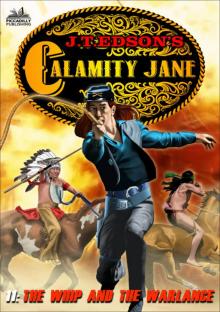 Calamity Jane 11
Calamity Jane 11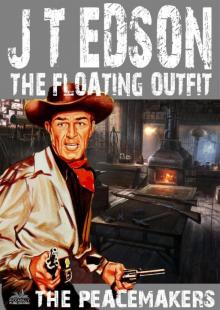 The Floating Outift 33
The Floating Outift 33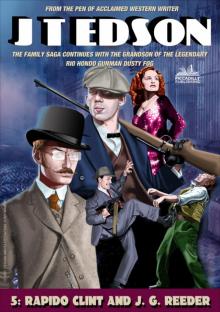 Cap Fog 5
Cap Fog 5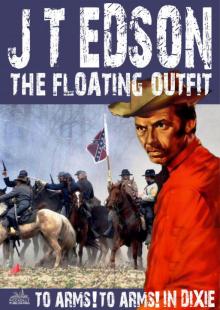 The Floating Outfit 34
The Floating Outfit 34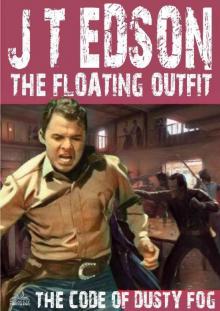 The Code of Dusty Fog
The Code of Dusty Fog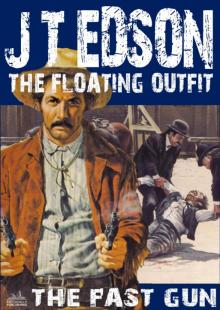 The Floating Outfit 21
The Floating Outfit 21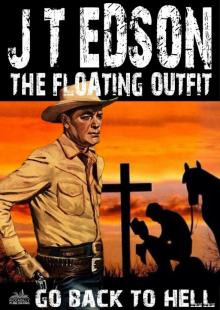 The Floating Outift 36
The Floating Outift 36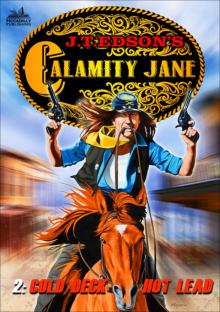 Calamity Jane 2
Calamity Jane 2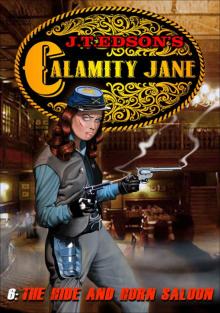 Calamity Jane 6: The Hide and Horn Saloon (A Calamity Jane Western)
Calamity Jane 6: The Hide and Horn Saloon (A Calamity Jane Western) Waco 7
Waco 7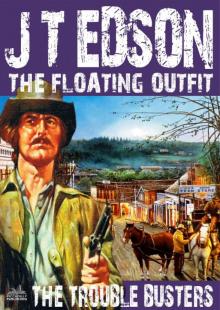 The Floating Outfit 25
The Floating Outfit 25 Waco 7: Hound Dog Man (A Waco Western)
Waco 7: Hound Dog Man (A Waco Western)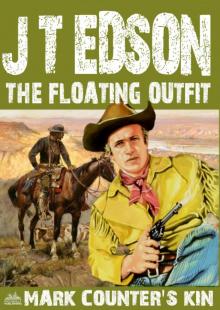 The Floating Outfit 47
The Floating Outfit 47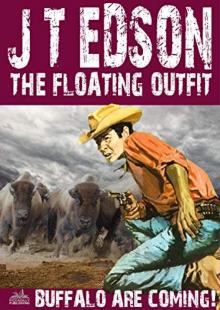 The Floating Outfit 42: Buffalo Are Coming!
The Floating Outfit 42: Buffalo Are Coming!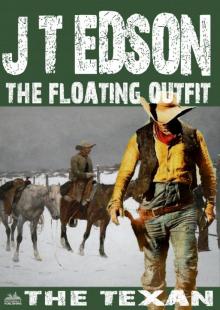 The Floating Outfit 46
The Floating Outfit 46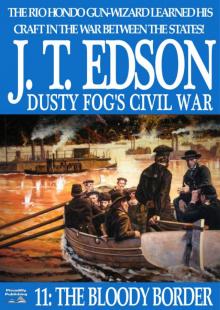 Dusty Fog's Civil War 11
Dusty Fog's Civil War 11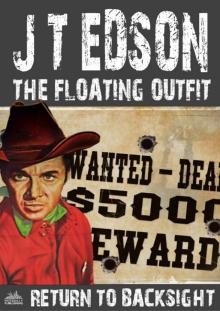 The Floating Outfit 61
The Floating Outfit 61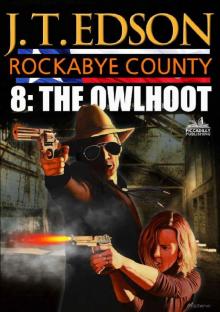 The Owlhoot
The Owlhoot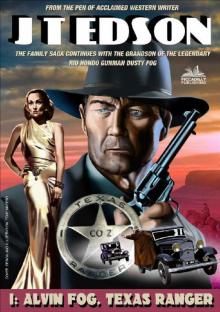 Alvin Fog, Texas Ranger
Alvin Fog, Texas Ranger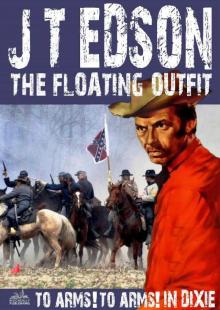 The Floating Outfit 34: To Arms! To Arms! In Dixie! (A Floating Outfit Western)
The Floating Outfit 34: To Arms! To Arms! In Dixie! (A Floating Outfit Western)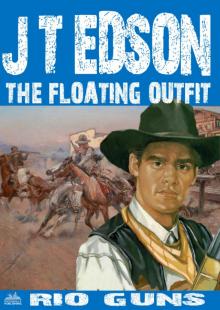 The Floating Outfit 44
The Floating Outfit 44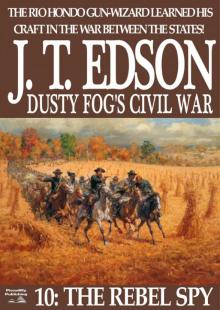 Dusty Fog's Civil War 10
Dusty Fog's Civil War 10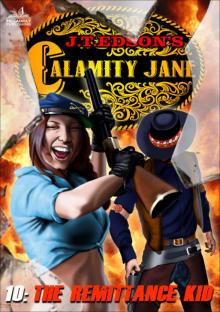 Calamity Jane 10
Calamity Jane 10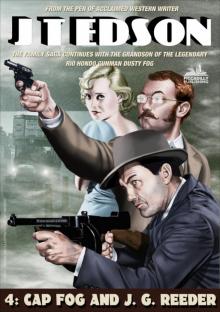 Cap Fog 4
Cap Fog 4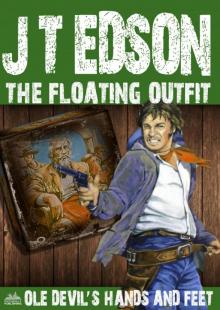 The Floating Outfit 51
The Floating Outfit 51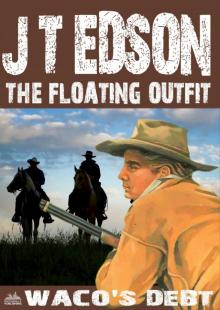 The Floating Outfit 50
The Floating Outfit 50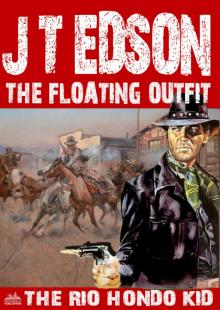 The Floating Outfit 49
The Floating Outfit 49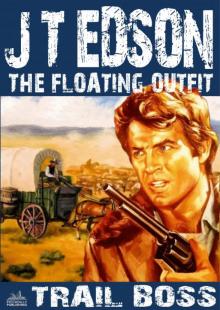 The Floating Outfit 10
The Floating Outfit 10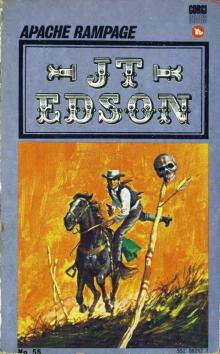 Apache Rampage
Apache Rampage The Floating Outfit 15
The Floating Outfit 15 Ranch War
Ranch War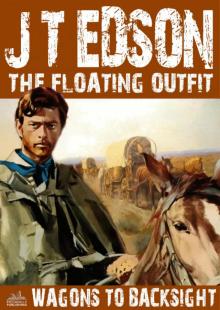 The Floating Outfit 11
The Floating Outfit 11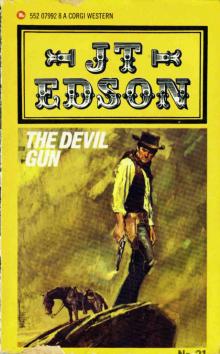 The Devil Gun
The Devil Gun Sacrifice for the Quagga God (A Bunduki Jungle Adventure Book 3)
Sacrifice for the Quagga God (A Bunduki Jungle Adventure Book 3)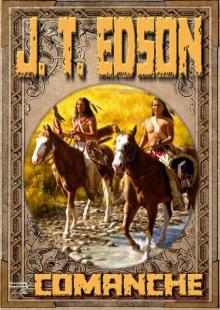 Comanche (A J.T. Edson Western Book 1)
Comanche (A J.T. Edson Western Book 1) The Floating Outfit 48
The Floating Outfit 48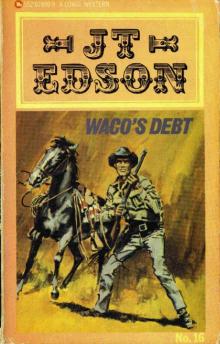 Wacos Debt
Wacos Debt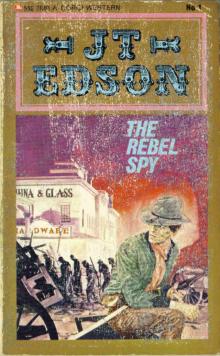 The Rebel Spy
The Rebel Spy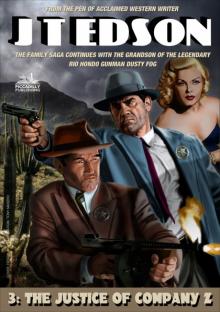 Cap Fog 3
Cap Fog 3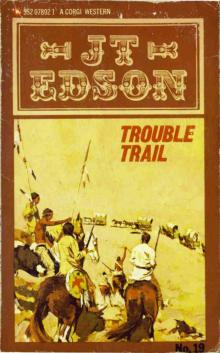 Trouble Trail
Trouble Trail Cold Deck, Hot Lead
Cold Deck, Hot Lead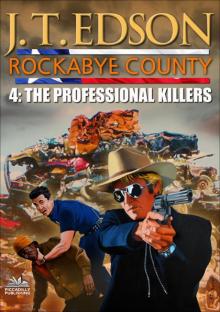 Rockabye County 4
Rockabye County 4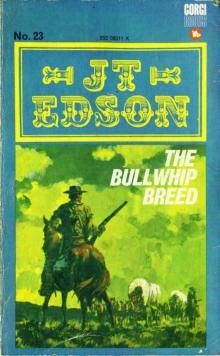 The Bullwhip Breed
The Bullwhip Breed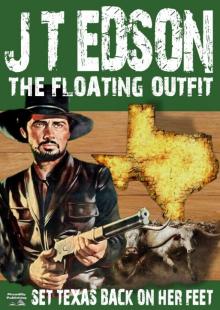 Set Texas Back On Her Feet (A Floating Outfit Western Book 6)
Set Texas Back On Her Feet (A Floating Outfit Western Book 6)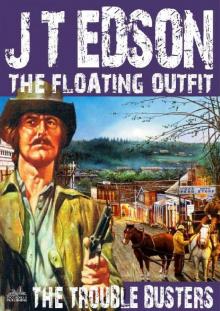 The Floating Outfit 25: The Trouble Busters (A Floating Outfit Western)
The Floating Outfit 25: The Trouble Busters (A Floating Outfit Western) Fearless Master of the Jungle (A Bunduki Jungle Adventure
Fearless Master of the Jungle (A Bunduki Jungle Adventure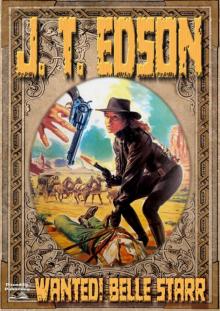 Wanted! Belle Starr!
Wanted! Belle Starr! The Big Hunt
The Big Hunt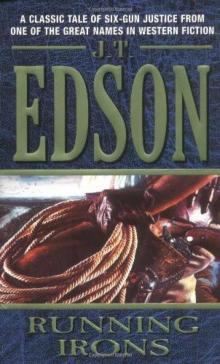 Running Irons
Running Irons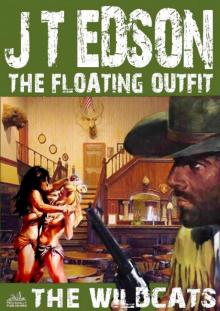 The Floating Outfit 19
The Floating Outfit 19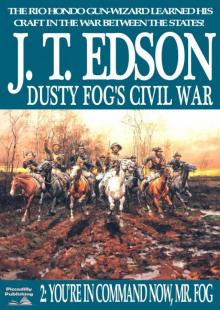 You're in Command Now, Mr Fog
You're in Command Now, Mr Fog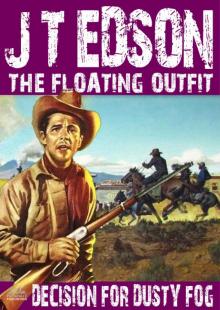 The Floating Outfit 27
The Floating Outfit 27 Texas Killers
Texas Killers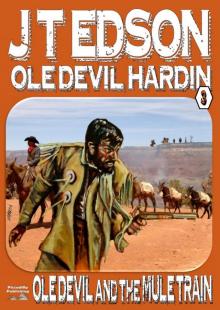 Ole Devil and the Mule Train (An Ole Devil Western Book 3)
Ole Devil and the Mule Train (An Ole Devil Western Book 3) Bunduki and Dawn (A Bunduki Jungle Adventure Book 2)
Bunduki and Dawn (A Bunduki Jungle Adventure Book 2)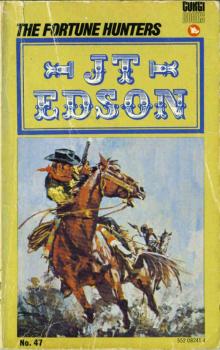 The Fortune Hunters
The Fortune Hunters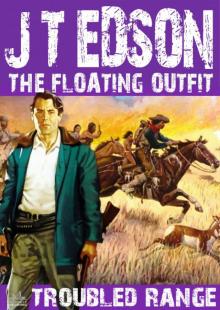 The Floating Outfit 12
The Floating Outfit 12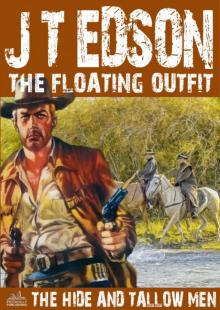 The Hide and Tallow Men (A Floating Outfit Western. Book 7)
The Hide and Tallow Men (A Floating Outfit Western. Book 7)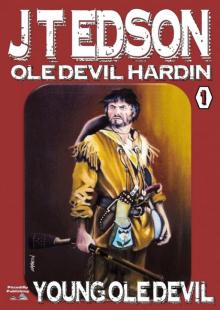 Young Ole Devil
Young Ole Devil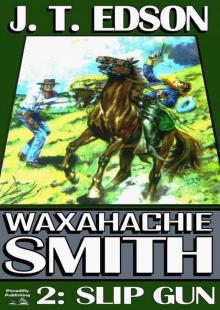 Slip Gun
Slip Gun The Drifter
The Drifter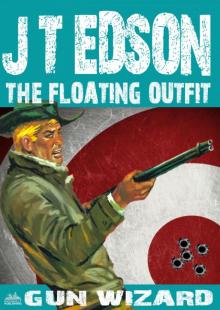 The Floating Outfit 45
The Floating Outfit 45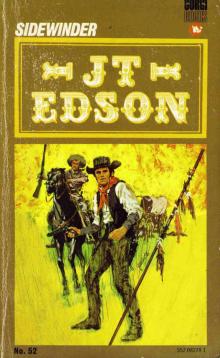 Sidewinder
Sidewinder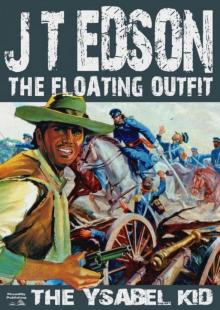 The Ysabel Kid
The Ysabel Kid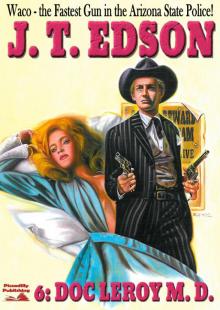 Waco 6
Waco 6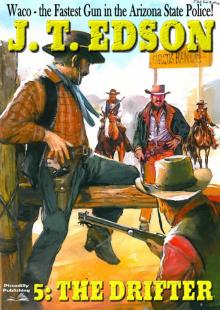 Waco 5
Waco 5 Point of Contact
Point of Contact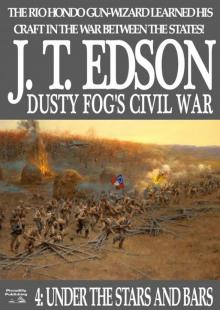 Under the Stars and Bars (A Dusty Fog Civil War Western Book 4)
Under the Stars and Bars (A Dusty Fog Civil War Western Book 4)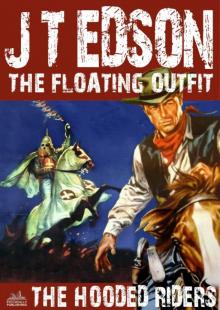 The Floating Outfit 9
The Floating Outfit 9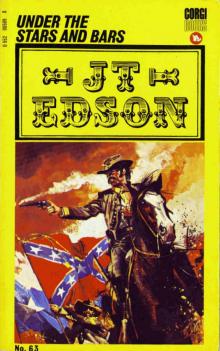 Under the Stars and Bars
Under the Stars and Bars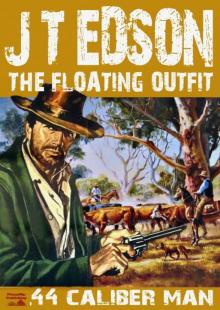 .44 Caliber Man
.44 Caliber Man The Floating Outfit 17
The Floating Outfit 17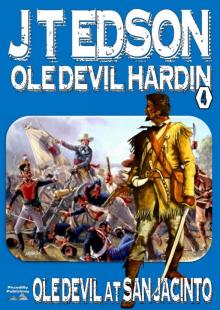 Ole Devil at San Jacinto (Old Devil Hardin Western Book 4)
Ole Devil at San Jacinto (Old Devil Hardin Western Book 4)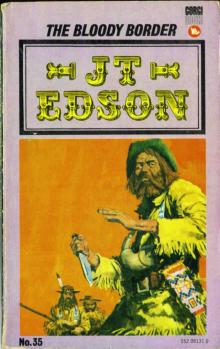 The Bloody Border
The Bloody Border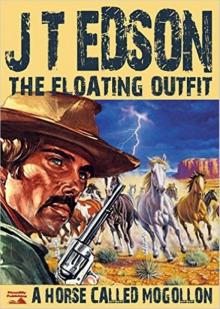 A Horse Called Mogollon (Floating Outfit Book 3)
A Horse Called Mogollon (Floating Outfit Book 3)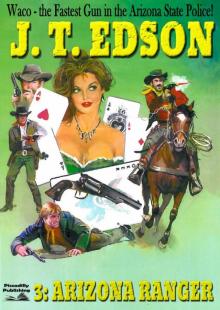 Waco 3
Waco 3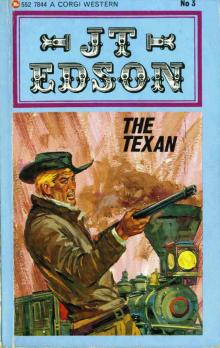 The Texan
The Texan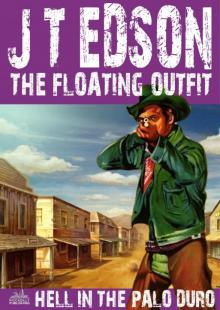 The Floating Outfit 35
The Floating Outfit 35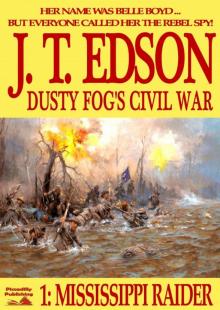 Mississippi Raider
Mississippi Raider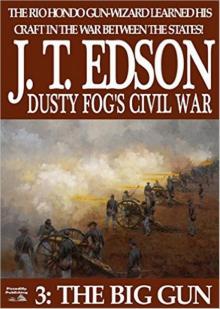 The Big Gun (Dusty Fog's Civil War Book 3)
The Big Gun (Dusty Fog's Civil War Book 3)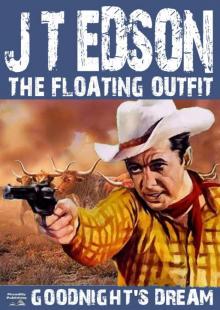 Goodnight's Dream (A Floating Outfit Western Book 4)
Goodnight's Dream (A Floating Outfit Western Book 4) Waco 4
Waco 4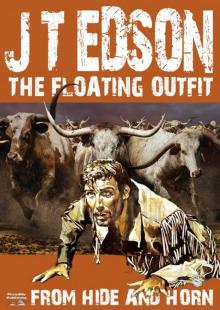 From Hide and Horn (A Floating Outfit Book Number 5)
From Hide and Horn (A Floating Outfit Book Number 5)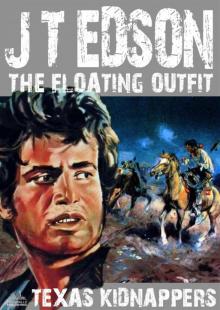 The Floating Outfit 18
The Floating Outfit 18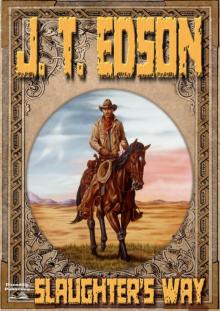 Slaughter's Way (A J.T. Edson Western)
Slaughter's Way (A J.T. Edson Western)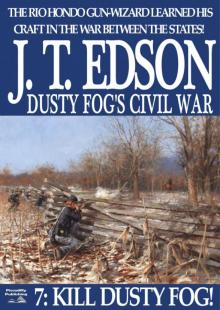 Dusty Fog's Civil War 7
Dusty Fog's Civil War 7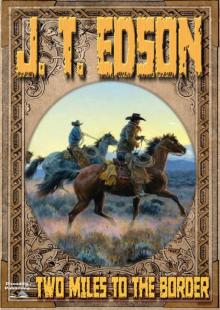 Two Miles to the Border (A J.T. Edson Western)
Two Miles to the Border (A J.T. Edson Western)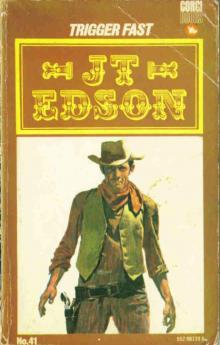 Trigger Fast
Trigger Fast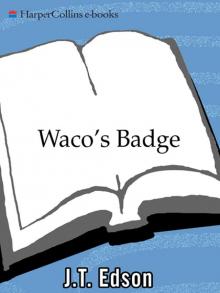 Waco's Badge
Waco's Badge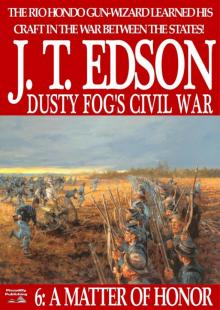 A Matter of Honor (Dusty Fog Civil War Book 6)
A Matter of Honor (Dusty Fog Civil War Book 6)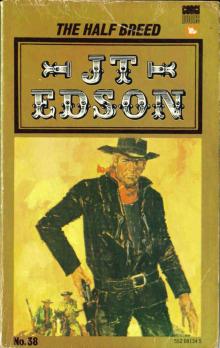 The Half Breed
The Half Breed Bunduki (Bunduki Series Book One)
Bunduki (Bunduki Series Book One)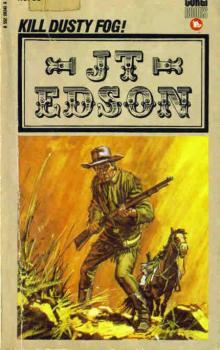 Kill Dusty Fog
Kill Dusty Fog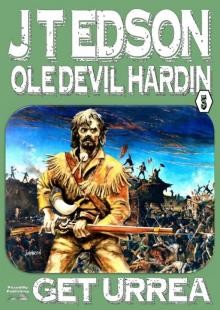 Get Urrea! (An Ole Devil Hardin Western Book 5)
Get Urrea! (An Ole Devil Hardin Western Book 5)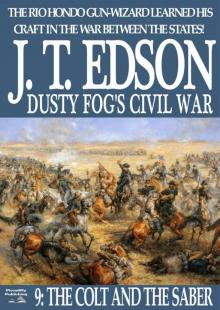 Dusty Fog's Civil War 9
Dusty Fog's Civil War 9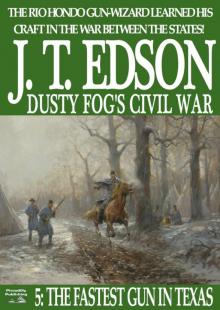 The Fastest Gun in Texas (A Dusty Fog Civil War Book 5)
The Fastest Gun in Texas (A Dusty Fog Civil War Book 5)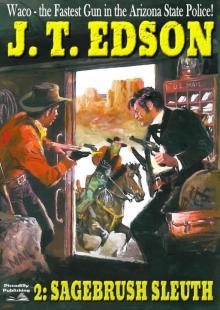 Sagebrush Sleuth (A Waco Western #2)
Sagebrush Sleuth (A Waco Western #2)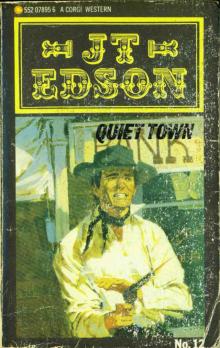 Quiet Town
Quiet Town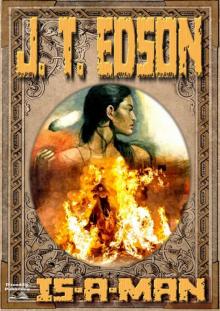 Is-A-Man (A J.T. Edson Standalone Western)
Is-A-Man (A J.T. Edson Standalone Western) Rockabye County 5
Rockabye County 5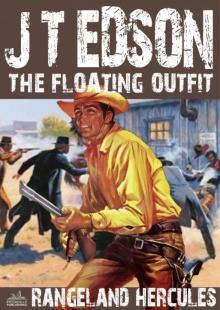 The Floating Outfit 14
The Floating Outfit 14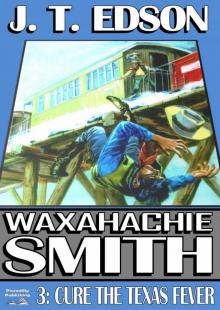 Cure the Texas Fever (A Waxahachie Smith Western--Book 3)
Cure the Texas Fever (A Waxahachie Smith Western--Book 3)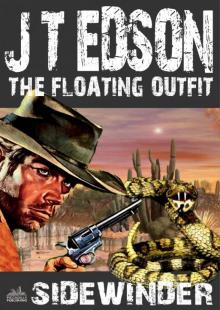 The Floating Outfit 13
The Floating Outfit 13 The Road to Ratchet Creek
The Road to Ratchet Creek